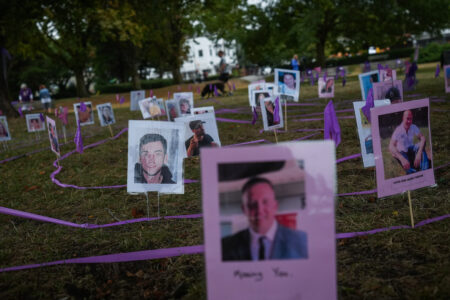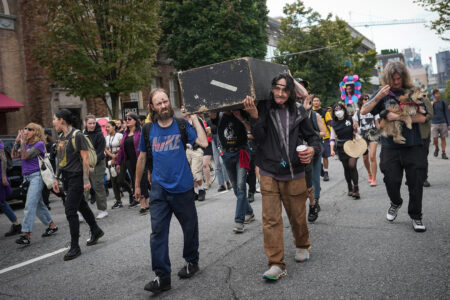
Governing is ducking. It’s hiding. It’s passing the buck and blaming the other. It’s washing your hands of it all when things go badly — and they nearly always go badly in one way or another.
Governing is a cynical enterprise.
At least that’s how it seems if one takes the Metro Vancouver Transportation and Transit referendum as a case study in politics trumping governance.
The referendum, which runs from March 16 to May 29 and requires citizens to fill out and return a mail-in ballot, asks residents of Metro Vancouver if they approve of the transit plan adopted by the Mayors’ Council – a group that includes representatives from each of the 21 municipalities that would be affected.
The plan requires raising $7.5 billion for capital expenditures, which would be achieved in part by instituting a 0.5 per cent sales tax in Metro Vancouver. (The tax would cost each resident about $125 a year, though that number is disputed and could in fact be higher or lower.) The rest of the funding for the plan would come from existing revenue streams and other levels of government. The money would buy buses and trains, bikeways and bridges, walkways and roads””and more.
The plan is good for everyone who lives, eats, walks, and breathes in Metro Vancouver, and for the many more who will move here in years to come. There are a number of pieces arguing the case for Yes; my colleague Stewart Prest wrote a good one. The No side is led by the Canadian Taxpayers Federation, whose arguments are about cost and waste.
Now, voting Yes is an obvious necessity for a growing city. But that should never have been my decision to make””at least not directly. The plan should never have come to a direct popular vote.
During the 2013 election, B.C. premier Christy Clark promised a referendum on changes to transit funding in Metro Vancouver. The province has a long history of populism and so this came as no surprise. But each nod to populism comes with a wink to cynical politics, and the transit referendum is no exception.
By putting the plan to the people””by making it a binary choice between a good but costly decision and no decision at all””the government of British Columbia has forced citizens into the unenviable role of political self-representation: a job for which few of us are equipped when it comes to long-term, highly-technical issues. And while we battle it out in our crumbling streets and on our crowded buses, the government of the day remains insulated from the political costs of the burden of the decision.
In a recent CBC piece, Simon Fraser University Professor Anthony Perl captured the politics of the referendum incisively, calling it “…a form of political insurance policy that our leaders have chosen to go with.” He’s on the mark, but he’s also rather too diplomatic. I think of it more as analogous to Pontius Pilate washing his hands before sentencing Christ to die; but, then again, I was raised Catholic.
The reason we elect representatives to make these decisions — the reason we don’t make them ourselves — is that our democracy is meant to function in a way that allows for not only the broad representation of the will of the people, but also for accountability, some degree of technical expertise, and measures for making difficult and potentially unpopular decisions that may be bad for some, but good for most — or, perhaps, decisions that are tough in the short-run, but essential in the long-run.
In Canada we operate on a trustee model of representation: we choose representatives and ask them to use their judgment to decide what should be done. If we don’t like their choices, we replace them. The delegate model, which aligns more closely with the populist agenda, assumes that representatives are chosen to directly represent the specific will of a given population. In this model, there is little space for discretion; there’s equally scare space for looking out for the good of the community. Again, this is one of the reasons we have cabinets and elected assemblies.
The delegate model divides us; it entrenches parochial interests and makes it harder for us to make big, important, long-term decisions for the whole as a whole. So do referendums. Thus when the government shirks its duty and throws a decision back to the people, temporarily turning themselves into mere delegates, into receptacles for the preferences of the mob, we are all worse off. Why? Well, because we tend to make bad decisions. For examples, look at ballot initiatives in the United States around taxation and transit. It’s a democratic wasteland.
Elected assemblies and cabinets are better at coordinating and making such decisions than the masses. They channel interests and arguments and ideas and battles into a stable and predictable process and they output fairly good and reliable decisions. Masses of people…less so.
Yet we still want citizens to be engaged. A better model for this would have been to hold a citizens’ assembly, like the province did in 2004 when the issue of electoral reform came to the fore. While that, too, was a choice put to the people, the issue was fundamental and procedural, and so it was a more legitimate candidate for a direct vote by the people. But more importantly it was preceded by a sophisticated assembly of citizens, randomly chosen from the population, who became educated on the issue, produced a recommended choice, and who then went throughout the province as de facto spokespersons for the plan.
The transit issue could have been dealt with in a similar way. A citizens’ assembly could have been called to work with the Mayors’ Council, or on their own, to develop a plan and to educate the province about it before a vote. Better yet, the vote could have been foregone all together, and the assembly could have educated both the people and the province, so that when our elected representatives did their duty and decided, everyone would understand what those officials were choosing and why.
But the referendum isn’t about policy or governance; it’s about politics. And it’s a pity. Because when representatives play populist politics with major decisions, they may get the safety of the crowd, but they will lose much more.
Photo by Evan Leeson / CC BY-NC-SA 2.0 / modified from original









